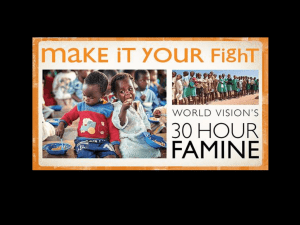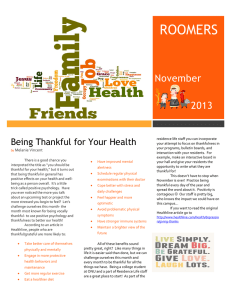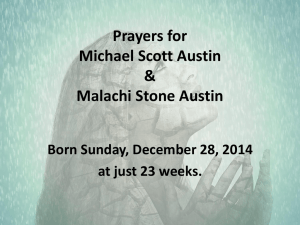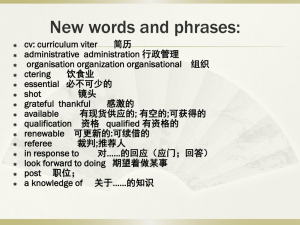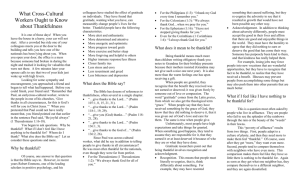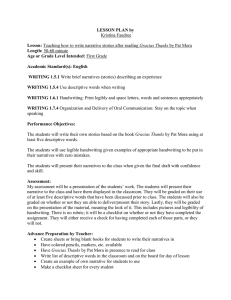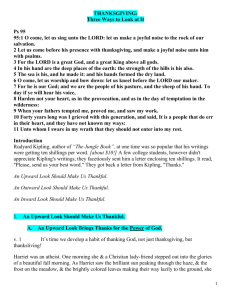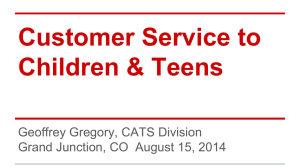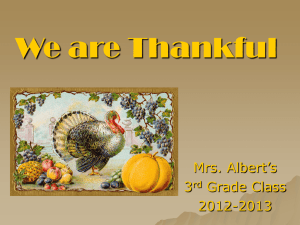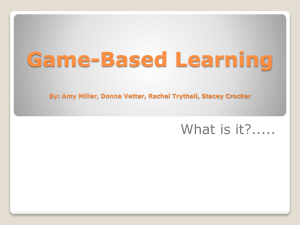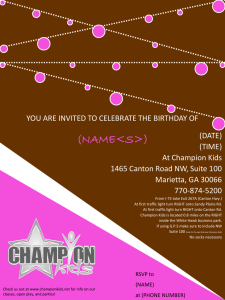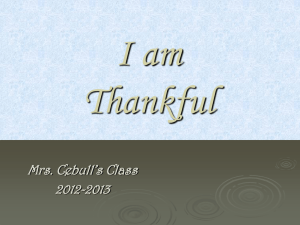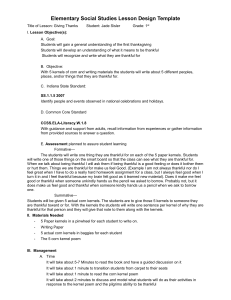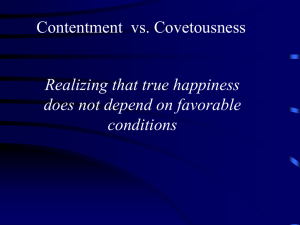Opening Session
advertisement
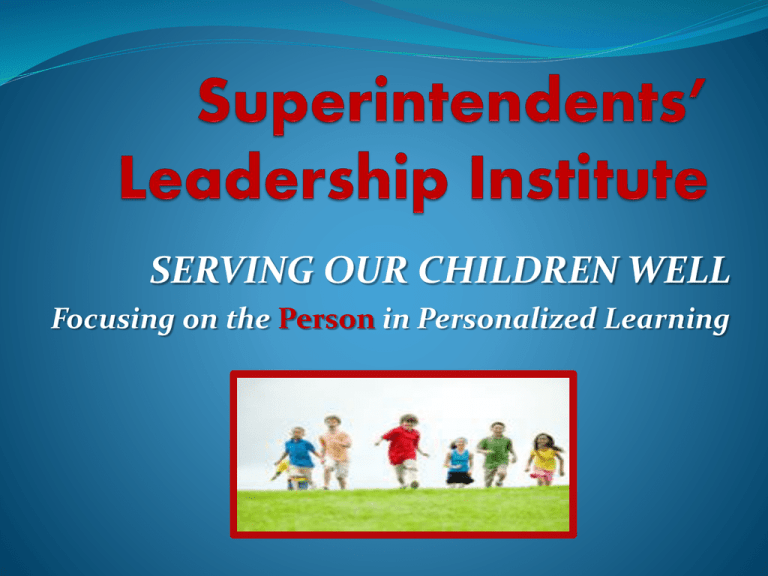
SERVING OUR CHILDREN WELL Focusing on the Person in Personalized Learning Join us in learning, reflecting, and planning better ways to serve our children. *Please have your conference handout and agenda in front of you. Dr. Jorea Marple State Superintendent of Schools Nadye Menking Hoggett Capital High School Be Thankful… Be thankful that you don’t already have everything you desire, If you did, what would there be to look forward to? Be thankful when you don’t know something For it gives you the opportunity to learn. Be thankful for the difficult times. During those times you grow. Be thankful for your limitations Because they give you opportunities for improvement. Be thankful for each new challenge Because it will build your strength and character. Be thankful for your mistakes They will teach you valuable lessons. Be thankful when you’re tired and weary Because it means you’ve made a difference. It is easy to be thankful for the good things. A life of rich fulfillment comes to those who are also thankful for the setbacks. GRATITUDE can turn a negative into a positive. Find a way to be thankful for your troubles and they can become your blessings. ~ Author Unknown ~ Where creativity meets technical ability. “Good Kids Doing Great Work” Happy – Healthy Contributing Citizens Knowledge and Skills Sets for PostSecondary Goals Optimism about the Future Resilience – Dreams Productive & Responsible Citizens •KNOW •BEHAVE •ACCOMPLISH “Good Kids Doing Great Work” A long journey of educational change to realize a powerful ideal. “We hold these truths to be self-evident, that all men are created equal, that they are endowed by their Creator with certain unalienable Rights, that among these are Life, Liberty and the pursuit of Happiness.” 1635 TO 2012 PUBLIC EDUCATION …From Few …To Some …To Many …To All and now…to EACH •1635 - The first Latin Grammar School is established in Boston for sons of certain social classes who are destined for leadership positions. Few… •1787 - The first school for girls, the Young Ladies Academy opens in Philadelphia ; begins to legitimize a proper education for girls. •1885 Some … - 16 states have compulsory-attendance laws but most are sporadically enforced : required children between the ages of eight and fourteen to attend school for twelve weeks. All states have them by 1918. •1865 –13 th Amendment ends slavery; no longer illegal for blacks to learn to read and write. Many … •1954 schools. - Brown v. Board of Education ends segregated 1944 – The G.I. Bill ended the long-standing • •tradition that a college education was only for the wealthy is broken. Many… •1972-Title IX becomes law. Prohibits discrimination based on gender in all aspects of education. Many… 1975 - PL94-142 becomes federal law. Students with disabilities have opportunities to learn in the least restrictive way. Many… •2001 – NCLB is signed into law. Holds schools accountable for student achievement by subgroups. All… Each significant step forward took tremendous courage, involved missteps and refinement of practice... From Few To Some To Many To All REAL KIDS-REAL PROBLEMS •We are educating children is a state with the least well-educated population in the nation. •Over half our kids live in poverty. The number of students in poverty increased by 3,000 from 2009 to 2010. •19,000 WV students are cared for by extended family members/family friends. •1 in five babies born is affected by prenatal drug use; our kids have among the highest rates of obesity and related health issues. •23% of ninth graders failed two or more subjects. •If all the students in institutional programs were combined, the student enrollment would be larger than 23 of the 55 county school systems. Annually, the percentage of students is growing. •About 1 in 4 of our students fail to graduate from high school. •Less than half (47.1%) are proficient in Reading/LA and mathematics(43%). •Poverty continues to manifest itself in ubiquitous ways that affect a child’s readiness to learn: expectations, background experiences, nutrition, health, stress, uncertainty, instability. We believe kids learn best when they know they matter. We believe kids learn at higher levels if they are active, wellnourished healthy and safe. We believe that learning is about developing the total child: the Body, Mind and Spirit. We believe kids learn in different ways and at different rates with differing needs and dreams. We must do a better job of addressing that in schools. We believe if learning is to last a lifetime then kids must see connections and relevance; they need understanding of big ideas learned through critical thinking and problem solving. We believe kids must own their own learning and see the connection between their own actions and what they achieve. We believe opportunities to learn must exceed the walls of the school and the time limits of the school day. We believe education is the place that must open a world of ideas, to expand interests and build dreams founded from a rich and broad curriculum. We believe the value a child has for learning is dramatically impacted by the expectations of the parents and community. Families and stakeholders have a moral obligation to improve the education of their children. To Ask: Are we on the right track? Do the beliefs, principles , and plans represent what you feel we need to do to serve our children well? Are these the actions we need to take? Chuck Heinlein Deputy Superintendent of Schools Nadye Menking Hoggett Capital High School Chuck Heinlein Deputy Superintendent of Schools Lydia McCue, Superintendent’s Office Mary Weikle Office of Healthy Schools
